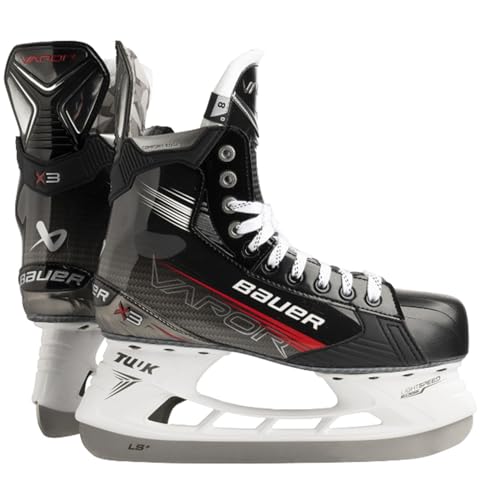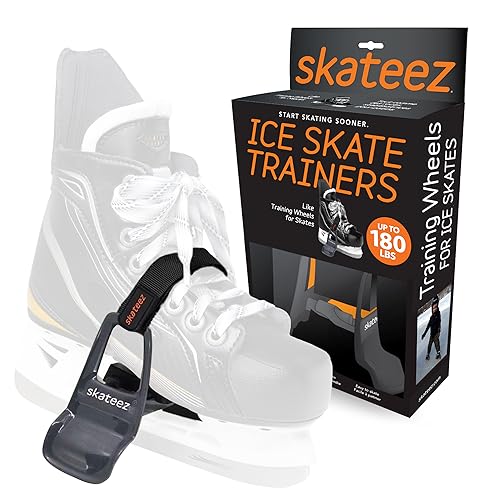Disclosure
This website is a participant in the Amazon Services LLC Associates Program, an affiliate advertising program designed to provide a means for us to earn fees by linking to Amazon.com and affiliated sites.
Yes, you can learn to ice skate without a coach—many beginners successfully teach themselves using online tutorials, practice drills, and the right equipment. While having a coach can accelerate your learning curve and fine-tune your technique, solo skaters can still make impressive progress with dedication and the right resources.
Ice skating might look effortless on TV, but the reality involves a few tumbles, lots of balance, and a bit of grit. Whether you’re drawn to figure skating, hockey, or just want to glide smoothly during weekend rink sessions, going the self-taught route is both possible and rewarding.
Best Skates and Gear for Learning to Ice Skate Without a Coach
Whether you’re practicing solo at your local rink or learning on a frozen pond, the right gear can make a huge difference. Here are three top products to support your self-taught ice skating journey:
Jackson Ultima Excel Women’s and Men’s Figure Skates
These beginner-friendly skates offer comfort, ankle support, and durability. They come pre-sharpened and have a soft lining, making them ideal for those learning without a coach.
- Ice skates for women with light support for learn to skate programs or…
- Reinforced vinyl upper with soft rolled collar and padded lining is durable…
- Foam backed tongue for womens ice skates, girls ice skates, toddler ice…
Bauer Vapor X3.5 Ice Hockey Skates
Designed for entry-level players, these skates provide excellent agility, comfort, and edge control. Perfect for solo learners looking to build confidence and transition into casual or competitive hockey.
- Bauer Vapor X3 Senior ice skates are packed with latest technology and yet…
- Skeleton – Digi Comp material, so the overall construction is lightweight,…
- The Collar Comfort Edge tech allows for a more effective interaction…
Skateez Ice Skate Trainer
A clever add-on for absolute beginners, this trainer helps balance and stability during your first skating attempts. Great for children and adults learning independently on ice.
- [HAPPY PARENTING] Our skate training product ensures a joyful parenting…
- [EASY SETUP & NO TOOLS REQUIRED] Experience effortless installation and…
- [CUSTOMIZED SIZING] Our product offers tailored sizing options to…
Just Because You Can Self-teach Doesn’t Mean You Should
A financial advisor once told me, “Just because you can afford something doesn’t necessarily mean you should have it right away.” And this is great advice.
The same goes for ice skating. Just because you can watch YT videos, video yourself as you glide on the ice, and watch others at rinks doesn’t necessarily mean that’s how you should learn this art form.
There’s always some cheapskate somewhere trying to cut expenses, someone who thinks paying a coach for group lessons or private lessons is a waste of money.
But these are almost always the same folks who end up with really bad injuries and hefty healthcare bills. They’re also the sort of people who seem to practice intensely but still can’t land an Axel jump many years down the road. Not that landing the Axel jump is an easy fete at all.
Don’t be that person. Pretty much everyone with a job can soak away adequate coaching fees for a trainer if they want it bad enough.
So, pony up for a certified ice skating coach, and pat yourself on the back after each session for having made the best decision ever.
5 Reasons Not to Learn Ice Skating On Your Own
It’s official: learning to ice skate without a coach is not a good idea. And here’s a bunch of reasons why hiring a trainer instead is a better strategy.
Ice Skating is a Dangerous Activity.
I hate to say it but a fact is a fact: all skating sports are fraught with danger. A wrong move and you go down super fast, breaking a wrist, an ankle, an elbow, or even worse, your skull. If no other argument against learning without help persuades your DIY soul, let this do it.
A coach is usually an accomplished ice skater, someone who’s gone through all kinds of mistakes and learned what works and doesn’t. Some of them have even competed at the Olympics.
With a dedicated instructor, you learn how to do skate skills safely. You even learn how to fall without injuring yourself or others at the rink. And the odds of getting hip or ankle injury as a result of prerotation sharply decrease.
A friend recently told me how dangerously one self-trained guy skates. According to Marcey, the dude is extremely clumsy at Camel Spins or Lutz.
Not surprisingly, no one likes him. Worst of all, the clumsy self-taught ice skater doesn’t seem to be aware of just how much everyone on the ice hates the entire messy ordeal.
You Likely Won’t Learn Good Posture and Technique.
If there’s one reason to skip meals and hire a good coach with the money you save, it’s learning proper posture. Bad posture can and often leads to back injuries. You get exhausted sooner than you normally would be the case with good posture.
Have you ever come across someone wondering why ice skating is so tiring instead of just enjoying the pastime? There’s a decent chance that the person chose to self-teach ice skating and never figured out what good form looks like.
A coach keeps reminding you to skate with your knees bent out a little, and to stay low all of the time. Because they know that bending over at the waist is a really bad idea.
Learning good ice skating jumping technique is another big reason many opt to consult with a coach. No one on Reddit will offer you any kind of helpful advice on proper jumping technique. All you’ll get from Redditors for seeking jumping advice is downvotes.
No One Becomes a Star Without a Coach.
If you hope to compete at the Olympics down the road, definitely get a coach. No one — and I repeat no one — ever becomes a celebrated star in the ice skating world without a good coach guiding their career.
With training, your chances of getting invited for shows and tests decrease dramatically. As a matter of fact, signing up for tests and competitions without a coach standing behind you is an exercise in futility with most clubs.
Pretty much no one wants to bet on a self-taught ice skater. Because the chances of failing the test are insanely high. Besides, no club wants a self-trained skater who’s not conversant with any of the competition rules.
If you dream of going to the Olympics or World Championship someday, do yourself a favor and get a coach. There’s no other way around it.
What if you’re not interested in competitive ice skating and just want to play at the recreational level? It’s still a bad idea to not work with a qualified instructor. Because you won’t master posture, and can easily get injured on the ice or hurt others.
You’ll Struggle Learning Anything Advanced
You may think you’re too good for a trainer, but this mentality is almost always the surest path to failure.
Look, you have to master your edges, 3-turns, crossovers, stops, and whatnot. No war you’ll get to great skating skills without nailing the basic ice skating moves first.
Seriously, how can a self-trained skater ever land doubles if their singles still need work? And if their 3-turns are still rudimentary, how could such a person ever do doubles?
You Won’t Know How to Correct Your Mistakes
One thing about ice skating is that very small mistakes in moves can result in serious problems. I mean problems are hard to spot and correct even for coaches.
It’s not unusual for coaches to record videos of beginners during lessons and then watch them in slow motion in an attempt to catch the smallest of errors hindering progress.
If it’s not easy for trainers, how could it be easy for you to learn solo?
Conclusion
Learning to ice skate without a coach is absolutely achievable if you’re motivated, patient, and equipped with the right resources. While a coach provides structured guidance and real-time feedback, many skaters progress just fine using online tutorials, drills, and quality gear.
The keys to solo success include consistent practice, safety awareness, and choosing the right skates and protective equipment from the beginning.
Whether you’re learning to skate for fitness, fun, or as a foundation for figure skating or hockey, your journey can be just as fulfilling without formal lessons. Stay determined, track your progress, and don’t be afraid to fall—that’s part of learning.
Frequently Asked Questions About Learning to Ice Skate Without a Coach
Is it safe to learn to ice skate on your own?
Yes, it’s safe if you follow precautions. Always wear protective gear such as a helmet, wrist guards, and padded shorts. Start in a well-maintained rink with beginner-friendly zones, and avoid crowded times to minimize collision risk.
How long does it take to learn basic ice skating without a coach?
Most people can grasp basic skating techniques like gliding and stopping within 3 to 5 practice sessions. Mastering balance, turns, and confidence might take several weeks depending on your consistency and fitness level.
What equipment do I need to get started?
At a minimum, you’ll need:
- Well-fitted beginner ice skates
- Helmet for head protection
- Gloves and padded clothing
- Knee and elbow pads (optional but helpful)
Can I really improve without feedback from a coach?
Yes, especially with video recording and online tutorials. Film your practice sessions to analyze posture and balance. Many apps and forums offer peer reviews and instructional feedback.
What’s the hardest part about self-teaching ice skating?
Building confidence and correcting technique can be challenging without expert eyes. However, consistent practice, slow progress tracking, and using training aids can bridge that gap.


